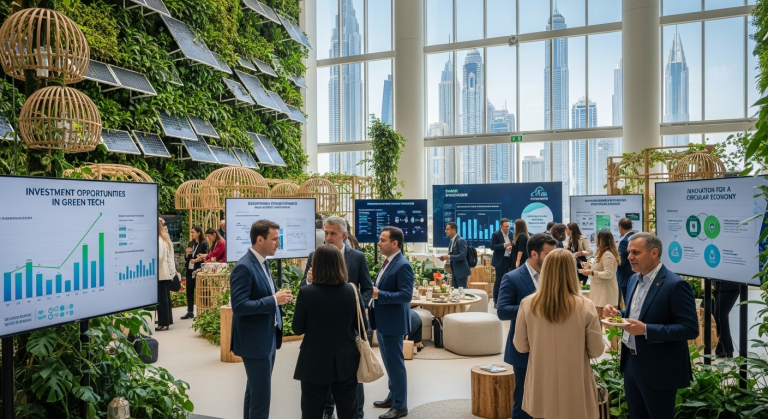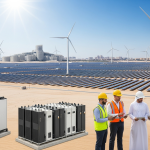Market Analysis and Opportunities
The United Arab Emirates (UAE), and Dubai in particular, stand at the forefront of global events, hosting world-class exhibitions, conferences, weddings, and cultural affairs. In this rapidly evolving landscape, the demand for Sustainable event planning services has grown considerably, in line with both international sustainability trends and Dubai’s strategic vision for a green economy. Modern consumers and organizations increasingly prioritize eco-friendly choices, responsible waste management, and sustainable vendor sourcing, which makes the sector especially attractive for those seeking business in Dubai or investment in the UAE.
Target Market Analysis
The events industry in the UAE has rebounded robustly following the global pandemic, with Dubai leading the recovery. The market for sustainable event planning is projected to grow at a CAGR of 10-12% between 2024 and 2030, reflecting increasing environmental consciousness and regulatory encouragement.
- Industry Size: Event expenditure in Dubai alone often exceeds AED 20 billion annually, reflecting a solid foundation for sustainable specializations.
- Key Segments: Corporate events, MICE (Meetings, Incentives, Conferences and Exhibitions), luxury weddings, government initiatives, and international expos.
- Consumer Preferences: Corporate and governmental clients are increasingly including sustainability criteria in their tender processes and procurement for events. Around 45% of surveyed UAE businesses indicate a preference for environmentally responsible event partners (Source: Dubai Chamber of Commerce, 2023).
- Trends Shaping the Market:
- Digital transformation (hybrid and virtual events, tech-driven attendee engagement)
- Demand for eco-friendly venues, waste reduction, and sustainable catering
- Adoption of international sustainability standards in event execution
Marketing Needs
Market visibility and education are essential for driving adoption. Sustainable event planning services in Dubai must invest in comprehensive digital marketing strategies, including:
- SEO-optimized content targeting keywords like “sustainable events Dubai,” “eco-friendly meetings UAE,” and “green event planning.”
- Pay-Per-Click (PPC) advertising to reach corporate clients, hospitality buyers, and event venues.
- Brand storytelling through case studies, blogs, and social media campaigns focused on successful sustainable events.
- Strategic partnerships with eco-certified venues and suppliers to reinforce credibility.
Implement regular market research to track customer preferences and competitive shifts. For guidance on building effective campaigns, see Sales and Advertising Services.
Expansion Potential
Opportunities abound to expand geographically and diversify offerings:
- Extension to Abu Dhabi, Sharjah, and other GCC hubs, where sustainability initiatives are gaining traction.
- Development of B2B and B2C services: corporate conferences, private celebrations, and tourism-related events.
- Export model for consulting or event management services, capitalizing on Dubai as a business hub.
As Dubai cements its reputation as the “global events capital,” sustainable event planning has ample room to grow with the city’s green ambitions.
Comprehensive Business Overview
Sustainable event planning services operate within the thriving UAE hospitality and MICE industries, providing services that minimize environmental impact and maximize social responsibility. The model typically includes:
- Consulting on sustainability: carbon footprint reduction, responsible sourcing, and ethical labor practices.
- Event planning and execution: logistics, supplier management, and attendee experience with a sustainable approach.
- Certification and reporting: aligned with local/international green standards (e.g., ISO 20121).
Target Audience:
- Corporate clients and multinationals
- Government entities (ministries, public sector agencies)
- NGOs and international organizations
- Private sector—weddings, galas, social events
Operational Scope in UAE:
- Service coverage across Dubai and major UAE emirates
- Potential for expansion through digital service delivery and alliances with local venues
Mission, Vision, and Objectives:
- Mission: To deliver innovative, carbon-neutral events that inspire positive environmental and social impact across the UAE.
- Vision: Become the region’s benchmark provider of sustainable events, supporting Dubai’s ambition as a leader in responsible tourism and business practices.
- Objectives: Drive measurable sustainability outcomes in every project, achieve client satisfaction, and uphold Dubai’s green economy standards.
Business Stage & Location:
- Most sustainable event businesses in the UAE are in startup or early growth phases, with rapid expansion potential fueled by market demand.
- Strategically located in Dubai Mainland or Free Zones (such as Dubai Media City or Dubai World Trade Centre Free Zone), which facilitate easy access to event venues, corporate headquarters, and government offices.
Competitive Advantage
The Unique Value Proposition (UVP) for Sustainable event planning services in Dubai is multi-dimensional:
From the Entrepreneur’s Perspective
- Alignment with Dubai’s long-term vision (e.g., Dubai Clean Energy Strategy 2050).
- Early entry into a niche market with high growth potential and limited competition compared to traditional event planning.
- Flexibility to leverage local and regional supply chains for sustainable goods and services.
From the Investor’s Perspective
- High return on investment potential driven by regulatory incentives (e.g., Dubai Sustainable Tourism initiative benefits).
- Growing list of large clients seeking ESG (Environment, Social, Governance) compliance, increasing demand for sustainability-focused vendors.
- Presence of government grants, subsidies, and CSR-driven business opportunities that de-risk investments.
From the Manager’s Perspective
- Operational advantages via digital tools (event management software, sustainability reporting platforms) that streamline planning and maximize transparency.
- Established relationships with vetted, eco-certified suppliers to assure consistency and quality.
- Ability to attract top talent passionate about sustainability, fostering strong corporate culture and brand loyalty.
For further examples of leveraging exclusive partnerships and technology in Dubai, see Business Setup Services.
Financial and Investment Needs
Financial Requirements
Setting up a sustainable event planning business in Dubai requires careful financial planning. Estimated capital needs include:
- Business setup and licensing: AED 25,000–40,000 (depending on Free Zone/Mainland and company size)
- Marketing and digital presence: AED 25,000–70,000 annually (website, campaigns, brand assets)
- Technology and software: AED 20,000–50,000 for event management platforms and reporting tools
- Staffing and HR: AED 200,000–400,000 per annum (3–5 full-time staff, excluding event-specific hires)
- Office space and equipment: AED 50,000–100,000 annually for flexible workspace or small offices
Investment Potential
Primary drivers for investment in Dubai’s sustainable event planning sector include:
- Attractive ROI, conservatively estimated at 15–20% within three years given premium pricing for ethical services and low direct competition.
- Scalability through replication of successful event formats and leveraging Dubai’s international business links.
- Investor-friendly environment; structures such as equity partnerships or venture capital supported by Dubai’s regulatory framework.
For targeted advice on structuring investments, visit Investment Consulting Services.
Financial Risks and Mitigation
Potential risks include:
- Cash flow gaps—due to seasonal fluctuations in event demand; mitigated by diversifying offerings to include year-round services (consulting, virtual events).
- Fluctuating venue costs and supplier prices; reduce risks by securing preferential contracts and maintaining a broad supplier network.
- Currency risks for international clients—manage by pricing in AED and using hedging tools.
Additional risk control measures: comprehensive insurance, legal retainers, and regular review of payment cycles.
Human Resources and Recruitment
Workforce Needs
A core team of 3–5 full-time professionals (event managers, client relationship managers, sustainability consultants) is typical, supplemented by:
- Temporary or contract-based staff for large events (logistics, tech support, hostesses).
- Specialist roles: digital marketers, ESG auditors, and vendor relationship leads.
Critical Skills Needed
- Project management and event logistics
- Understanding of sustainability certification standards
- Client communication and negotiation
- Digital marketing and data analytics
HR Challenges and Solutions
- High competition for skilled staff in the UAE’s events and hospitality sectors; address through:
- Attractive employment benefits (flexible working, bonuses, health insurance)
- Continuous learning via sustainability and project management certifications
Compliance with UAE Labor Laws
- Adherence to visa sponsorship procedures, employment contracts, and end-of-service gratuity per UAE law.
- Maintaining HR documentation and regular legal compliance audits.
Utilize resources from consultancies like Residency and Citizenship Services to support HR compliance.
Infrastructure and Operations
Infrastructure Needs
- Physical presence: Small flexible office, or virtual office setup in a prominent Free Zone (Digital Park, Internet City).
- Technology: Subscription-based event management and virtual meeting platforms, cloud storage, and CRM systems.
Operational Optimization
- Potential pain points: Manual vendor coordination, limited process automation, inefficient feedback collection.
- Actionable improvements:
- Adoption of ERP systems to streamline supplier and logistics management.
- Lean process mapping to eliminate bottlenecks in event execution.
Legal Compliance
- Registering with the Department of Economic Development (DED) for Mainland, or with a Free Zone authority.
- Commercial licensing aligned to event management and consulting.
- Opening a corporate bank account; appointing a local agent if required (mainland only).
For comprehensive support, reference Business Sales Services.
Innovation and Technology
- Integration of AI-driven attendee engagement (e.g., chatbots, personalized event content).
- Blockchain for transparent supply chain tracking and carbon offset certifications.
- Cloud-based tools for seamless multi-venue management.
Investing in emerging technology ensures competitiveness and future readiness.
Marketing and Branding Strategies
Brand Status
- Awareness among early adopters and sustainability-focused enterprises is rising, but broader market recognition remains in progress.
- Brand must clearly articulate its value, sustainability credentials, and impact metrics (saved emissions, reduced waste).
Marketing Channels
- Digital marketing: Emphasis on SEO, content marketing (case studies and best practice guides), and targeted PPC campaigns.
- Social media: LinkedIn (for B2B), Instagram and Facebook (for B2C/private clients).
- Traditional marketing: PR in trade publications, partnerships with hotels and venues.
Optimize all platforms for both English and Arabic audiences.
360-Degree Campaigns
- Integrated strategies that include educational webinars, on-site event demos, influencer collaborations, and e-newsletters.
- Examples: Launch a “Green Events Week” campaign involving local suppliers and regulatory bodies; partner with Dubai’s sustainability forums.
- Measure engagement via KPIs: website leads, social shares, and conversion rates.
For inspiration, explore industry insights on the Persian Horizon blog.
Growth and Development Potential
Growth Strategies
- Expand service offerings into event sustainability audits and consultancy.
- Form strategic partnerships with venues, corporate networks, and eco-friendly suppliers.
- Develop recurring revenue streams (subscription-based sustainability consulting).
Networking
- Engage with government-led business initiatives (Dubai Exports, Dubai Chamber events).
- Leverage international business councils and trade networks to access new client bases.
Tap into broader business ecosystems, such as Persian Horizon’s network.
International Potential
Dubai’s location and infrastructure offer a springboard for expansion into:
- Other GCC markets (Saudi Arabia, Qatar), replicating green event formats.
- International consulting via remote service delivery and franchising.
Dubai’s connectivity and trade freedoms underpin international scalability.
Sustainability and Innovation
- Championing zero-waste events, circular supply chains, and digital innovations.
- Align projects with Dubai Vision 2030 and global standards (e.g., United Nations Sustainable Development Goals).
- Continuous assessment and improvement through feedback, technology audits, and supplier evaluation.
Alignment with Dubai’s Market
Cultural Alignment
- Services designed to respect both local traditions and the cosmopolitan nature of Dubai’s population.
- Event formats adapted for diverse clientele, with multilingual staff and culturally-appropriate protocols.
Local Regulatory Compliance
- Strict adherence to UAE commercial and labor laws; timely renewal of trade licenses and employee visas.
- Clear documentation for VAT registration and reporting under UAE tax regulations.
Work closely with legal advisors or business consultancies for ongoing compliance.
Advantages of Dubai
- Business-friendly environment: zero corporate and personal tax in Free Zones, simplified customs procedures.
- Excellent transport, telecommunications, and event infrastructure.
- Pro-business policy and government support for sustainable initiatives.
- Access to a multicultural, affluent client base with global business ties.
These factors make sustainable event planning a strong proposition for those seeking new business opportunities in Dubai.
Local Challenges & Solutions
- High market competition and customer acquisition cost; overcome with sharp UVP, continuous innovation, and niche branding.
- Premium operating costs in central Dubai; mitigate by utilizing co-working spaces, digital platforms, and flexible outsourcing of non-core activities.
- Managing regulatory changes; maintain close relationships with government partners and industry associations.
Conclusion and Recommendations
The business opportunity for Sustainable event planning services in Dubai is propelled by strong market demand, progressive regulatory support, and the emirate’s ambition to lead as a smart and sustainable city. For entrepreneurs, the sector offers a chance to launch an impactful business in Dubai; for investors, it represents scalable returns in an expanding market; for managers, it delivers operational and strategic depth supported by technology and network potential.
Key recommendations for stakeholders include:
- Prioritize digitization of workflows and engagement with eco-certified suppliers.
- Invest in targeted digital marketing and alliance-building for rapid client acquisition.
- Maintain compliance and adaptability in HR, operations, and legal matters.
- Pursue continuous innovation and sustainability to remain relevant in Dubai’s dynamic business environment.
For step-by-step business setup guidance or to tap into regional networks and expertise, consult Persian Horizon’s business setup services.
Call to Action
Stakeholders ready to explore Dubai business opportunities or scale their event operations can benefit from expert support. Discover how specialized partners like Persian Horizon provide end-to-end consulting, market analysis, and business solutions to help you achieve lasting success in the UAE’s vibrant events sector.







